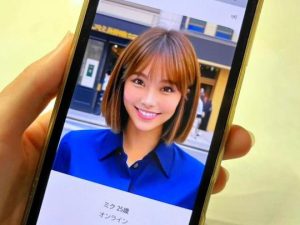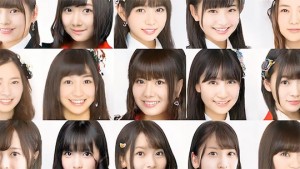Idol Kuriemi on the future of gravure in the age of generative AI
The gravure idol, YouTuber, and entrepreneur Kuriemi recently gave an interview to Weekly Gendai about the use of generative AI in the gravure industry.
The 31-year-old is the CEO of Pinyokio, a “virtual human” celebrities agency set up in December 2023 with funding from AiHUB, where she serves as CMO.

In July that year, Kuriemi released a digital photo book with AI-generated content based on her image, but its release was cut short after only a few days by Amazon due to legal concerns. A print photo book in which six “creators” used AI to generate images of her was released in 2024.
Kuriemi, who used to work as Emi Kurita before she went independent and now boasts millions of followers on social media, has also made her portrait available for public use on OpenAI’s Sora 2 video generator. Here is Kuriemi pictured with OpenAI’s Sam Altman. Fans have been creating short videos featuring AI versions of Kuriemi.
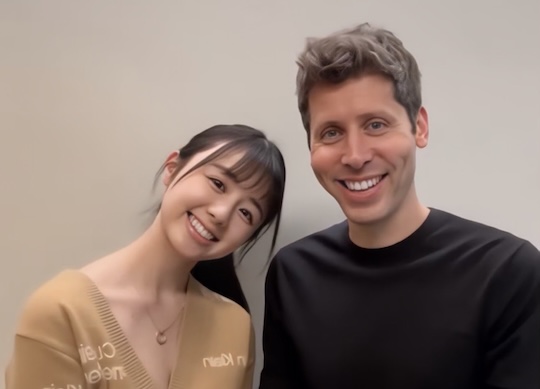
The idol sees her efforts as empowering.
“I think the most important thing is that with Sora 2, I’ll be able to establish an unshakable pioneering position. The most important thing is that I’m in a position where I can make my own decisions and take immediate action on things that typical entertainment production companies would consider risky and hesitate to do.
The developed of AI is, in a sense, an existential threat to gravure, so Kuriemi thinks it’s better to be involved in a way that allows idols to steer the trends.
“For a company like ours that operates in the core areas of AI and entertainment, predicting the future trends of big tech and developing content on our platform is a matter of life and death. An update provided by big tech could destroy the value of our product the next day, so it’s important to quickly assume a pioneering position.”
But getting in first doesn’t guarantee a permanent leading role.
“We have an AI fashion model service for apparel companies called Bachamo that aims to reduce costs using AI models, but less than six months after its launch, Google’s image-generating AI, Nano Banana, was announced. There have been concerns about portrait rights issues with Nano Banana, and while I feel that our Bachamo service is superior in terms of service quality, as a manager I’m concerned about how long we can maintain this advantage.”
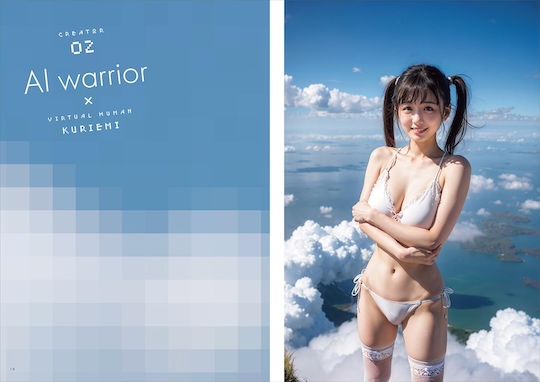
Kuriemi predicts a future where everyone will just accept AI images in their lives.
“People are becoming less uncomfortable or resistant to AI-generated images. I think that this is more due to the fact that we’ve become accustomed to seeing them, rather than any significant improvement in the quality of the images themselves. Nowadays, anyone can easily create AI-generated images on their smartphone. Two years ago, you needed a high-spec PC and specialized software, so image generation was a higher hurdle for many people than it is now. Humans are very sensitive to technology they have never come into contact with, and it can even evoke a kind of rejection reaction, but I think that once you have some personal experience with it, those negative feelings tend to fade.”
Kuriemi has savvily put herself at the center of her AI efforts, but she would like to see more idols and models follow in her stead, and to develop AI as a tool for giving models more agency and freedom.
“Our company has developed IP businesses, such as developing merchandise and photo books using generative AI, in collaboration with real-life influencers. We would like to extend this method to more models and others in the future. One of our company’s major visions is to acquire half-dormant IP licenses, including for anime, and use AI to reboost them to increase sales. A portion of the revenue generated by using generative AI will also go to our company, which has agent contracts. That’s the kind of business model I’d like to build. Ultimately, I believe the remaining value in the age of AI lies in how many rights you hold. Until now, most talent rights have belonged to the talent agencies they sign contracts with, but in the age of AI, I think agent-like contractual relationships will become more mainstream than ever before.”
As we see it, though, the issue is that if the curernt trend continues, there will be far fewer idols and models in the first place. While Sora may be advantageous to established figures like Kuriemi, it may not be for the next generation of talent.
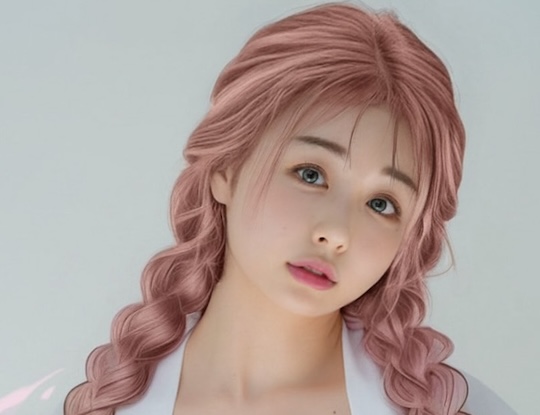
“Like YouTubers and others, this isn’t an overnight way for individuals to make money, but generative AI will expand the ways individuals can make even more money.”
Kuriemi also believes that generative AI isn’t as “easy” as people think.
“Generative AI can make things as easy as you want, but even if you want to make a photo book and sell it at a regular price, a lot of manual work is required. [You need] the ability to imagine and conceive the overall finished image and put it into words as a prompt, and the ability to make revisions.
Using generative AI can make things incredibly efficient in the sense that it expands the scope of what a single creator can do. In other words, individual creators who previously could only do 1 to 10 can now do 1 to 100. Because they can do this, it feels like the workload per person is more likely to increase as a result.”
She’s also not blind to the fact that the idol industry is fundamentally about a connection between fans and idols, who need to be human to keep that affective relationship going in the long term.
“People who consume content don’t see any special value in the fact that it’s created by generative AI, and even in the age of AI, what’s needed in fan businesses is a human touch. I would like to continue to galvanize the entertainment industry by skillful use of generative AI as a tool.”

